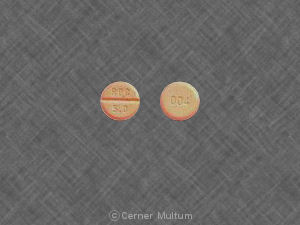ProAmatine Side Effects
Generic name: midodrine
Medically reviewed by Drugs.com. Last updated on Oct 28, 2024.
Note: This document provides detailed information about ProAmatine Side Effects associated with midodrine. Some dosage forms listed on this page may not apply specifically to the brand name ProAmatine.
Applies to midodrine: oral tablet.
Important warnings
This medicine can cause some serious health issues
Oral route (tablet)
Can cause marked elevation of supine blood pressure and should be used only in patients whose lives are considerably impaired despite standard clinical care.
Clinical benefits of midodrine hydrochloride tablets, principally improved ability to carry out activities of daily living, have not been verified.
Precautions
Do not take other medicines unless they have been discussed with your doctor. This especially includes over-the-counter (nonprescription) medicines for appetite control, asthma, colds, cough, hayfever, or sinus problems, since they may tend to increase your blood pressure.
Serious side effects of ProAmatine
Along with its needed effects, midodrine (the active ingredient contained in ProAmatine) may cause some unwanted effects. Although not all of these side effects may occur, if they do occur they may need medical attention.
Check with your doctor immediately if any of the following side effects occur while taking midodrine:
More common side effects
- blurred vision
- cardiac awareness
- headache
- pounding in the ears
Rare side effects
- fainting
- increased dizziness
- slow pulse
Other side effects of ProAmatine
Some side effects of midodrine may occur that usually do not need medical attention. These side effects may go away during treatment as your body adjusts to the medicine. Also, your health care professional may be able to tell you about ways to prevent or reduce some of these side effects.
Check with your health care professional if any of the following side effects continue or are bothersome or if you have any questions about them:
More common side effects
- burning, itching, or prickling of the scalp
- chills
- goosebumps
- urinary frequency, retention, or urgency
Less common side effects
Rare side effects
- backache
- canker sores
- dizziness
- drowsiness
- dry skin
- leg cramps
- pain or sensitivity of the skin to touch
- stomach problems such as gas, heartburn, or nausea
- trouble seeing
- trouble with sleeping
- weakness
See also:
For healthcare professionals
Applies to midodrine: oral tablet.
General adverse events
The most common adverse reactions were paresthesia (includes hyperesthesia and scalp paresthesia), piloerection, dysuria (includes dysuria, increased urinary frequency, impaired urination, urinary retention, and urinary urgency), pruritus (includes scalp pruritus), and supine hypertension.[Ref]
Cardiovascular
- Common (1% to 10%): Supine hypertension, flushing
- Uncommon (0.1% to 1%): Reflex bradycardia
- Rare (less than 0.1%): Tachycardia, palpitations
- Frequency not reported: Vasodilation/flushing face[Ref]
Nervous system
- Very common (10% or more): Paresthesia (18.3%)
- Common (1% to 10%): Headache
- Frequency not reported: Feeling of pressure/fullness in the head, dizziness, somnolence[Ref]
Dermatologic
- Very common (10% or more): Piloerection (13.4%), pruritus (12.2%)
- Common (1% to 10%): Rash
- Frequency not reported: Skin hyperesthesia, erythema multiforme, dry skin[Ref]
Genitourinary
- Very common (10% or more): Dysuria (13.4%)
- Frequency not reported: Impaired urination[Ref]
Gastrointestinal
- Common (1% to 10%): Nausea, dyspepsia, stomatitis
- Frequency not reported: Dry mouth, canker sore, pyrosis, gastrointestinal distress, flatulence, abdominal pain, vomiting, diarrhea[Ref]
Other
- Common (1% to 10%): Chills, pain
- Frequency not reported: Asthenia[Ref]
Psychiatric
- Uncommon (0.1% to 1%): Sleep disorders, insomnia, restlessness, excitability, irritability
- Frequency not reported: Confusion/thinking abnormality, nervousness/anxiety[Ref]
Hepatic
- Rare (less than 0.1%): Abnormal hepatic function, raised liver enzymes[Ref]
Musculoskeletal
- Frequency not reported: Backache, leg cramps[Ref]
Ocular
- Frequency not reported: Visual field defect[Ref]
References
1. (2001) "Product Information. ProAmatine (midodrine)." Roberts Pharmaceutical Corporation
2. Cerner Multum, Inc. "UK Summary of Product Characteristics."
More about ProAmatine (midodrine)
- Check interactions
- Compare alternatives
- Reviews (8)
- Drug images
- Dosage information
- During pregnancy
- Drug class: miscellaneous cardiovascular agents
Patient resources
Other brands
Professional resources
Related treatment guides
Further information
ProAmatine side effects can vary depending on the individual. Always consult your healthcare provider to ensure the information displayed on this page applies to your personal circumstances.
Note: Medication side effects may be underreported. If you are experiencing side effects that are not listed, submit a report to the FDA by following this guide.

